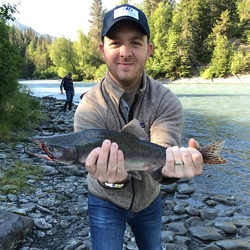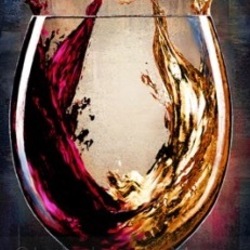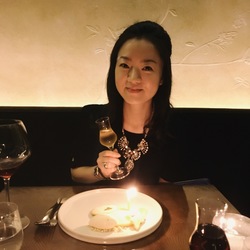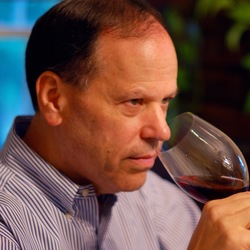Five Gold Hands
Two Hands
Lily's Garden McLaren Vale Shiraz 2008
This was a big ol' boy! After the 84 Chappellet, I had to switch gears a little bit! Second wine served blind to more or less the same crowd. Poured black and inky. Nose with a little bit of meat but this was mostly black dark roasted fruits. Entry was dark blackberry, sweet plums, figs, baking spice. Power. Lots of guesses for syrah and petite sirah and I don't think anyone really thought this one was 11 years old. Finished with a lot of roasted sweet and chewy tannin. I didn't think I was in the mood for this kind of wine until I realized that I was in the mood for this kind of wine! I think this one has another five to ten years easily. Wondering why this one seems to get lower scores on Delectable, but I have a feeling that most people don't give these the age they need. — 6 years ago

Wente Vineyards
Morning Fog Livermore Valley Chardonnay 2016
This yellow-gold wine rings the “old-style Cali” bell in all the right ways. A nose of apricots, mangoes and apples is helped along with the smell of buttered popcorn. Oak treats the palate as well, draping over the tropical fruit like a sunshade. The acidity is zesty, yet the mouthfeel tends toward creaminess due to the wine sitting on the lees for five months. The oak is a definite part of the wine, but the effect is softened enough so that it's a pleasure, not a pain. — 6 years ago
Lanson
Gold Label Vintage Brut Champagne 2008
Is this number five? I’ve lost track already. “Gold Jerry, Gold.” Can taste a touch of the age on this bottle. #freundfest2018 — 7 years ago
Bisson
Marea Cinque Terre White Blend 2015
Cinque Terre means five lands. Yellow with gold hue, lemon and tangerine peel, crushed rock, wet stone and rusty blade. On the palate: slightly flint, high acidity, apricots, lemon curd, yellow bouquet floral note, silky texture with smooth coating in the mouth. Say 12.5 % abv on the label but feel more in the mouth. Min 40% Bosco with Max 40% Albarola/Vermentino combined. — 7 years ago
Salinia Wine Company
Wellspring Solera Chardonnay
This is too good not to have the correct designation. It is the Salinia Wine Company Wellspring Chardonnay Solera out of Sonoma (I think Wellspring Cellars is in Texas). As far as I know, this is a five vintage Solera blend of Chardonnay from Heintz Vineyard near Occidental. Dark gold, nutty sherry notes with great acidity. Love this. — 8 years ago
Campovida
Bonofiglio Vineyard Roussane
The wine pours a medium gold color with promising honeysuckle, baked apple, melon, and baking spice aromas. On the palate it's full bodied for a wine that sees no ML. It's harmonious with bright acidity and a hint of tannins that add to its delightful structure. It shows baked white peach and apple, melon, a bit of nectarine and baking spice flavors with a lingering finish. This is a great winter white! The fruit was sourced from the Bonofiglio Vineyard, owned by Glenn McGourty and his two brothers. It's a seven-acre organically farmed vineyard is located five miles north of the town of Hopland. It was aged in neutral French oak for five months with lees contact and stirred once a month to increase mouthfeel. 14.2% abv — 8 years ago
Krug
Brut Champagne Blend 2006
Very young at this point...medium gold in glass with hints of tobacco and leather notes from oak. A bit tight initially, the wine opens expansively in the mouth with apple, banana, brioche, and juicy ripe pear. Huge future predicted, but on this day was an also-ran. Hands off for a few years. — 5 years ago
Frog's Leap
Napa Valley Chardonnay 2016
Family-owned winery, founded by the Williams Family in 1981, devoted to sustainable principles and producing wines with respect for terroir. Fermented in new French oak barrels, usually four to five days then racked to concrete vessels to complete fermentation sur lie for 10 months. Pale light gold with medium+ aromas of floral, stone and citrus fruits. On the palate this full-bodied wine shows flavors of peach, tart apple and lemon peel flavors. Long finish with generous acidity ending with an earthy nutty wet stone character. Nice! Tasting Sample. — 5 years ago
Two Hands
Bella's Garden Barossa Valley Shiraz 2009
There are some professional critics that would tell you this 09 Bella’s Garden is at the end of its life. I understand this producer to buy into that. This wine is drinking beautifully with at least five years of good drinking still ahead.
The nose reveals slightly stewed dark currants and fruits. Blackberries, black raspberries, black plum, olallieberries, boysenberries, black cherries & blueberries. Black licorice, dark cola, black pepper, steeped dark fruit tea, limestone minerals, smokey meats, sweet tarriness, used French Roast coffee grounds, touch of rubber toy=va, liqueur notes, mocha powder, light dry herbs and withering & fresh dark florals, violets and lavender.
The body is lush, ruby, elegant and full. The tannins are round, velvety smooth and still have some teeth. The structure, tension, length and balance says this wine is right around its peak. Great mouthfeel. The fruits on the palate are candied. Blackberries, black raspberries, black plum, olallieberries, boysenberries, black cherries & blueberries. Black licorice, dark cola, black pepper, steeped dark fruit tea, limestone minerals, smokey meats, mid intensity dark spice, sweet tarriness, used French Roast coffee grounds, hints of black olive, touch of rubber toy=va...a bit less than the nose, liqueur notes, mocha powder, light dry herbs, moist clay, underbrush, dry crushed rocks and withering & fresh, amazingly bright dark florals, violets and lavender. The acidity is a lukewarm rain shower. The gorgeous finish is flat out elegant, well balanced fruit & earth and persists for minutes.
I would have given this a 94 if not for the touch of va.
Photos of; Two Hands Cellar Door, fountain in the courtyard, tasting bar as you walk in and the view from our patio tasting. — 6 years ago

Dyer Vineyard
Diamond Mountain District Cabernet Franc 2014
Thanksgiving wine number 6. Very much a split decision for the group for wine of the night. Half of people thought it was the 2006 Dyer Cab edging this one out, where the other half believed that this one edged the 2006. My personal observation is that this wine definitely had a sweeter and more youthful and concentrated fruit profile upfront as one would expect, yet lacked the complexity that the 2006 displayed. This wine displayed a lot of dried herb, floral jasmine, raspberry and black cherry throughout. The tannins on the wine are massive, very stiff. In five years, this one could probably easily outdo the 2006 Cabernet. Alas my willpower is total crap to keep any of these CF's around longer than a couple of years so I can only postulate. All I know is that you need to try to keep your hands off of these for a while if possible. If not, you still have yourself a darn good bottle of wine! — 6 years ago
Château Brane-Cantenac
Grand Cru Classé en 1855 Margaux Red Bordeaux Blend 2005
I have a six-pack of this 05. I thought after 10 years in bottle, it would be interesting to check in on its evolution. While tasty, I’ll wait another 8-10 to open another. Even after 2-3 hours in the decanter, it’s still a very young adolescent. On the nose, slightly sour blackberries & dark cherries, dark currants, baked black plum, haunting blue fruits, anise, whiff of spice, steeped tea, dry stones, dry crushed rocks with dry top soil, caramel, vanilla with fresh & dry red florals. The body is thick & full. Tannins are starting to round out. It’s velvety on the palate. The fruits are; bright, fresh & ripe and really show the greatness of the 05 vintage. Dark currants, blackberries, dark cherries, baked black plum, haunting blue fruits, baked strawberries, cherries, raspberries on the long set, dark spice, clay & loamy dry top soil with crushed rocks, dry stones, cigar with ash, graphite, dry stems, slight herbaceous character, mint, used leather, clove, caramel, vanilla, fresh & dry red florals with violets. The round acidity is about perfect. The structure and length are still strong. The balance is in harmony. As for the long finish, it’s lush, ruby, rich and well polished. Photos of; Chateau Brane Cantenac, large wood vats, Henri Lurton and Estate vines. Producer notes and history...Chateau Brane Cantenac began in the early 17th century. At the time, the estate was known as Domaine Guilhem Hosten. Even that far back, wine was produced from the property. In fact, the wine was so highly regarded it was one of the more expensive wines in Bordeaux. It sold for almost as much money as Brane Mouton. This is interesting because of who went on to buy the vineyard in the 1800’s. The Baron of Brane, also known as “Napoleon of the Vineyards”, purchased the Chateau in 1833. At the time of the sale, the estate was called Chateau Gorce-Guy. To get the funds needed to purchase the Margaux vineyard, the Baron sold what is now called Mouton Rothschild, which was at the time of the sale, known as Chateau Brane-Mouton. Not such a good move with hundreds of years in hindsight! In 1838, the Baron renamed property taking his name and the name of the sector where the vineyards were located and called it Chateau Brane Cantenac. The Chateau later passed to the Roy family, who were well-known in the Margaux appellation in those days, as they owned Chateau d’issan. Moving ahead to 1920, the Societe des Grands Crus de France, a group of merchants and growers that owned several chateaux located in the Medoc including; Chateau Margaux, Chateau Giscours, and Chateau Lagrange in St. Julien, purchased Chateau Brane Cantenac. Five years later, M. Recapet and his son-in-law, François Lurton, took over Brane Cantenac along with Chateau Margaux. Lucien Lurton (the son of François Lurton) inherited Brane Cantenac in 1956. Today, the estate is still in the hands of the Lurton family. Brane Cantenac is owned and run by Henri Lurton. After being given the responsibility of managing Brane Cantenac, it was under the direction of Henri Lurton that large portions of the vineyard were replanted. Vine densities were increased, the drainage systems were improved and the plantings were also, slowly changed. The vineyard of Brane Cantenac is planted to 55% Cabernet Sauvignon, 40% Merlot, 4.5% Cabernet Franc and .5% Carmenere. Carmenere was used for the first time in the 2011 vintage. The only other Chateau I know that still uses Carmenere is Clerc Milon. The 75 hectare Left Bank vineyard of Brane Cantenac is essentially unchanged since it earned Second Growth status in the 1855 Classification. At least that is the case with the 45 hectares used to produce the Grand Vin of Brane Cantenac. Those 45 hectares are planted surrounding the Chateau. Those vines are located just in front of the Cantenac plateau and are the best terroir that Brane Cantenac owns. They have other parcels, which are further inland and much of those grapes are placed into their second wine, Le Baron de Brane. Those additional hectares can be divided into 3 main sections. Behind the Chateau, they have 15 hectares of vines on gravel and sand, 10 hectares across the road with sand, gravel and iron and a 13 hectare parcel with gravel called Notton, which is used for their second wine. The vineyard is planted to a vine density that ranges from 6,666 vines per hectare on the plateau and up to 8,000 vines per hectare for the vines located behind chateau, in their sandier soils. The higher levels of vine density are always found in the newer plantings. The terroir of Brane Cantenac consists of deep gravel, sand and clay soil. Experiments in the vineyards are currently looking at becoming more organic in their vineyard management. Today, more than 25% of Brane Cantenac is farmed using organic farming techniques. It is expected that over time, the amount of hectares farmed with organic methods will be increased. Brane Cantenac has gone through 2 relatively recent modernization’s in 1999, when they added began adding the first of their smaller vats to allow for parcel by parcel vinification and then again in 2015 when they completed a much more complete renovation of their cellars and vat rooms. While Brane Cantenac is a traditional producer, they are no stranger to technology as they were one of the first estates to embrace optical grape sorting machines. In very wet vintages, they can also use reverse osmosis. To produce the wine of Chateau Brane Cantenac, the wine is vinified in a combination of temperature controlled, traditional, 22 oak vats, 18 concrete tanks and 20 stainless steel vats that vary in size from 40 hectoliters all the way up to 200 hectoliters, which allows for parcel by parcel vinification. 40% of the fermentation takes place in the oak vats. The oldest vines are vinified in vats that are selected to allow for separate parcel by parcel vinification. The younger vines are vinified more often together in the same vats. However, the Carmenere is entirely micro-vinified, meaning that those grapes were completely vinified in barrel, using micro-vinification techniques. This can also happen because the amount of grapes produced is so small. Some vats can be co-inoculated, meaning they go through alcoholic fermentation and malolactic fermentation simultaneously. At Chateau Brane Cantenac, malolactic fermentation takes place in a combination of French oak tanks and barrels. The wine of Brane Cantenac is aged in an average of 60% new, French oak barrels for 18 months before bottling. The initial 2 months of aging is done with the wine on its lees, which adds more depth to the wine. There second wine is Le Baron de Brane. Le Baron de Brane is not new. In fact, previously, the second wine went under the name of Chateau Notton, which took its name from one of the main parcels where the grapes were planted. During the late 1950’s and into the 1960’s, having a second wine was important as the estate declassified 3 vintages, due to extremely poor, weather conditions in 1956, 1960 and 1963. Production of Chateau Brane Cantenac is about 11,000 cases per year. — 7 years ago

Purple Hands Winery
Holstein Vineyard Pinot Noir 2016
Outstanding Pinot Noir! Beautiful aromas of cassis, raspberry jam, Flowers and baking spices. Red and black fruit flavors with hints of earth and spice. Medium body, and enough tannin to five this wine some heft. There is a lushness to this wine. Love this producer. Revisited in December 2021. More floral aromas. Still fantastic! — 5 years ago
Williams Selyem
Russian River Valley Pinot Noir 2004
I’ve had a a fair amount of older Williams Selyem Pinot Noirs, this one is the most different. It seems more extracted and darker than the bright; cherries, strawberries & pomegranate Pinots from them that we’ve had a run on over several years.
The noses reveals, deep, dark, ripe; currants, blackberries, black cherries with liqueur notes, baked black plum, black raspberries with hints of blue fruit. Touch of smokiness, cinnamon, clove, vanillin, black licorice, mid intensity, sweet tarriness, herbaceous notes, mint/eucalyptus character, touch of tree sap, black, rich earth, steeped fruit tea, limestone, dry rock powder, dark chocolate bar, mocha notes with fresh, withering & dry, dark, red florals and just a hint of violets.
The body is medium full. It has gorgeous mouthfeel. There are still round, softened, teethe & tarry tannins here. Tannins were in the bottle neck which, is not always traditional even in older Pinot’s. The structure, tension, length and balance are really nice with another three to five years of good drinking ahead. It’s right around its peak. Perhaps, just the other side of the bell curve. Dark, ripe; currants/cassis, blackberries, black cherries with liqueur notes, baked black plum, black raspberries, cooked rhubarb, raisins with more blue fruit showing vs. the nose. Touch of smokiness, cinnamon, clove, light nutmeg, vanillin, black licorice, mid intensity sweet tarriness, herbaceous notes, mint/eucalyptus character, touch of tree sap, black, rich earth, steeped fruit tea, limestone, dry rock powder, dark chocolate bar, mocha notes with fresh, withering & dry, dark, red florals and violets beaming on the finish. The acidity is excellent. The long finish is; ruby, ripe, elegant, gorgeous, extremely well balanced and persists on the palate with warm, dark spice.
IMHO, Williams Selyem Pinot Noirs do not score well early and really shine at 10 years plus in many vintages. They are a Sonoma Pinot pioneer and a gold standard comparison for other producers and Pinot lovers to take note.
Photos of; Williams Selyem winery, Sofia’s great handy work with flowers and one of our two raised garden boxes. 💐 🌸 🌺 🌹🌼🥀 🌽 🥒🥬 🍅
Happy Memorial Day weekend all! Hope you are grilling & enjoying some of your favorite wines. — 6 years ago
Five Star Cellars
Stellar Walla Walla Valley Red Blend 2009
Was not familiar with Five Star Cellars’ work until yesterday, but after last nights successful Super Tuscan blend we decided to try the Boudreaux blend tonight. Really enjoyed this wine. Very bold red fruit, leather, smoked sea salt? and herbal notes on the nose. Lots of cedar wood, bergamot tea, 80%+ dark cocoa powder, baking spices particularly cardamom stood out to me. The right amount of spice on the palate. Velvety tannins. Really left you wanting more of this wine. Impressed with the quality of the wines they are producing around that $30-50 price retail. Apparently this 09 won gold medal at the 2015 Walla Walla Wine Competition. Looking forward to trying their Syrah next. — 7 years ago
Saddleback Cellars
Rancher Red Blend 2011
Lucked out grabbing the last bottle at our local store. Cab based blend with Merlot, Zin and Petite Sirah to round it out. Notes of stone fruits, blueberry, tobacco, five spice, black pepper linger well after your first sip. Ready to get my hands on more of their wines. Saddle up. — 8 years ago
Jarman
Estate Grown Carmel Valley Chardonnay 2012
This Carmel Valley wine is Monterey County born and bred, made from two different Chardonnay clones, 95 and 76. It is aged in new French oak barrels for five months, and the touch of wood is just about perfect. The alcohol hits a lofty 14.2% abv. Well, it would be lofty in Burgundy. In California, it's about normal. The organic and certified sustainable grapes are harvested and sorted by hand, and only seven barrels were made
The wine is a pretty golden color and smells very much like citrus and earthy minerals with a faint hint of smoke thrown in. It's a titillating nose for a Chardonnay. The palate holds up the promise of the aromas. There is a strong sense of minerality up front, which gives way momentarily to a butterscotch flavor. That flavor in turn hands off to lemon-lime and notes of fresh stream water that has run over sandstone rocks to get to you. The oak make itself known, but in a very polite way. Fresh, zippy acidity feels perfect for a picnic or the Thanksgiving table. — 9 years ago
















Delectable Wine

Follow to learn about our favorite wines & people.
The 2015 Brunello di Montalcino Madonna delle Grazie is showing a much darker and more backward bouquet, as earth tones and smoky minerals give way to woodland berries, white smoke, crushed fall leaves, worn leather, and a hint of licorice. On the palate, I’m finding soft textures with depths of dark red fruits and spice, as savory herbs and mineral tones come forward, overlaying fine tannins. The finish is long, showing its powerful structure, as dried black cherry and inner florals resonate over a core of grippy tannin. Hands off the 2015 Madonna delle Grazie for at least the next three to five years; it’s an epic wine in the making. (Eric Guido, Vinous, April 2020)
— 5 years ago